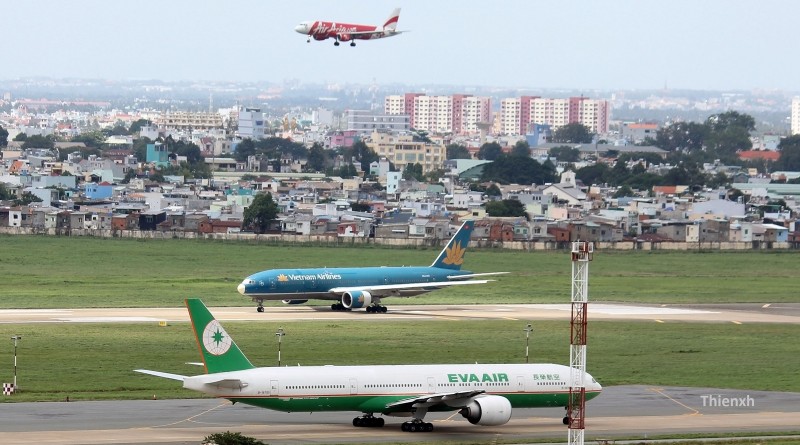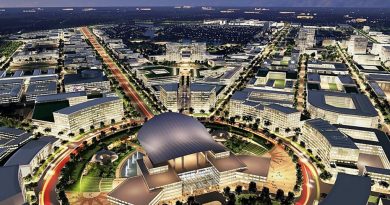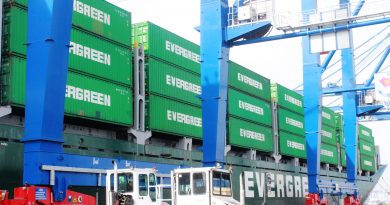ACV plans $1.2 billion aviation infrastructure development
Airports Corporation of Viet Nam (ACV), the largest enterprise in the domestic transport sector, will spend about VND26.2 trillion (US$1.2 billion) on aviation infrastructure development over the next three years.
In an investment scheme recently sent to the Ministry of Transport, the company said it expects to use some VND7.8 trillion to upgrade facilities in “flight zones” and more than VND18.4 trillion to improve terminals and parking spaces.
The firm, which manages 22 of the country’s international and domestic airports, said it will prioritise investments for terminals showing high passenger growth and special socio-economic importance.
The important airports include Noi Bai in the north, Dong Hoi, Phu Bai and Cam Ranh in the centre, and Tan Son Nhat, Con Dao and Phu Quoc in the south.
ACV also asked the ministry to consider adjusting the framework for some aviation service rates, which apply to domestic flight routes at airports, according to enternews.vn.
It said, while the number of passengers travelling on domestic routes represents two thirds of all aviation passengers in Viet Nam, the prices of landing and take-off services on domestic routes are around 2.5 times lower than those of similar services on international routes.
The firm suggested that such price gap should be narrowed within the next five years to ensure the efficiency of investments and asset exploitation.
Industry insiders said if the suggestion is accepted, the rates of domestic flight tickets are likely to increase in the future.
Meanwhile, relevant parties have reportedly made significant progress for the ACV to get closer to an agreement with French group Aéroports de Paris (ADP), which is a potential strategic investor of the ACV.
According to Dau tu (Vietnam Investment Review) online, Deputy Prime Minister Vuong Dinh Hue last week gave finance and transport ministries a nod to let ACV designate contractors to accelerate the strategic partnering process.
The transport ministry has designated local brokerage company BIDV Securities, a consultant for ACV equitisation, to continue to advise it on selling stakes to investors. This contract is worth about VND2.9 billion.
This month, Vietnamese law firm YKVN also won a bid, with approval from the ministry, to become a legal advisor for negotiations related to the partnering deal. The contract is valued at VND6 billion.
“With these consulting tools getting in place soon, ACV will have necessary confidence to negotiate with ADP,” Deputy Minister of Transport Nguyen Hong Truong said, and added that the two companies are expected to conclude their deal this year.
ADP expected the two sides to basically agree on investment provisions by September. Such an agreement would create one of the premises for French President Francois Hollande’s September visit to Viet Nam, Truong said.
According to Dau tu, ADP planned to buy shares of ACV at a price no less than VNĐ13,100 per share – the lowest winning rate when ACV auctioned its shares during an initial public offering on the HCM City Stock Exchange last December.
ADP has been operating 37 airports in the world through its subsidiary Airports de Paris Management (ADPM), including Charles de Gaulle and Orly in Paris.
ACV officially changed into a joint stock company in March, when its charter capital was recorded at more than VND21 trillion.
The State retained a capital ratio of 75 per cent of the company’s equity and announced that a 20 per cent stake would be available to strategic investors.
Biz Hub reported earlier this year that Changi Airport International, a subsidiary of Singapore’s Changi Airport Group, and the Bank for Investment and Development of Viet Nam was also eyeing a strategic partnership with ACV.
Brian Davis, vice president of US firm Honeywell Aerospace, told Biz Hub late last year that Viet Nam was one of the top 10 fastest growing aerospace markets in the world.
The country’s aviation market had been growing by an average 7 per cent to 8 per cent per year in terms of passenger traffic, and this growth was expected to continue over the next 20 years, he said.
Source VNS





